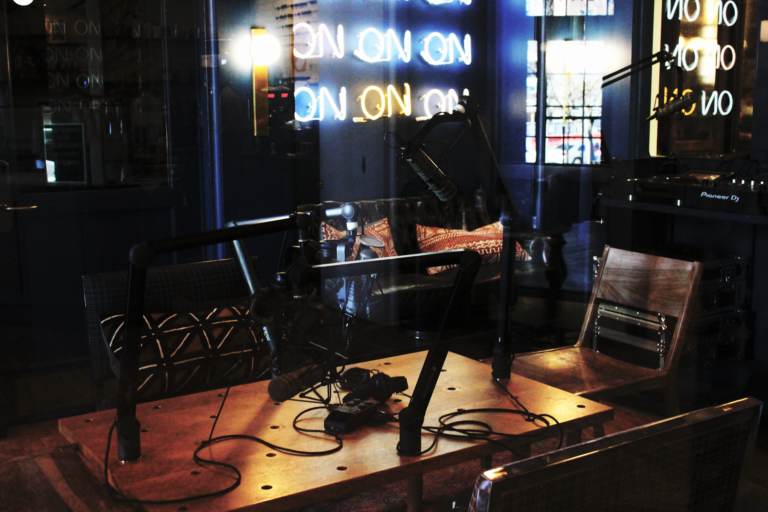Full Service Radio, a community radio station and podcast network run out of The LINE Hotel in Adams Morgan, has been dormant since the pandemic forced the hotel to shut down all in-person operations. Now, 26-year-old Carmen Dominguez-Estrada, the hotel’s new brand experience manager, wants to reopen the space, bringing back the radio station by early 2024.
The LINE Hotel became a cultural hub for the community through this radio station, creatively directed by Jack Inslee. Full Service Radio was once the home of over 30 weekly shows, all broadcasting from the studio in Adams Morgan. The project took off in 2017, shortly after the hotel’s grand opening, and served as an outlet for local D.C. creatives and musicians until it shut down. Now, four years later, Dominguez-Estrada wants to make the room a space for radio shows and podcasts again. In its new rendition, the station will run on Half Moon, an independent media company focused on broadcasting based in New York City.
Dominguez-Estrada lights up the room. The day I went to meet her was the first time I had ever seen people inside the Full Service studio. She was in the middle of an afternoon of meetings with Surf Allah, head of Half Moon. Dominguez-Estrada, dressed in a Canadian tuxedo complemented by an oversized rhinestone-encrusted belt and silver hoop earrings lost in her bleached blonde curls, was at the center of the action. Chronically on her phone, but simultaneously immersed in her new position, she often recalls an idea and bounces it back into the current conversation. She’s a creative and energetic person who is engrossed in her job goals and the hotel’s branding. Dominguez-Estrada said she desperately wants to make the studio a lived-in space again, giving a platform to the D.C. music and arts scene.


“The scene is beautiful and doesn’t get seen by institutions like this one,” she said, speaking of the diverse, but historically underground, music scene in D.C.
There’s a palpable stillness to the room even though it’s full of vivid, creative, excited people. The station is a glass-enclosed room in a nook to the left of the main entrance of the hotel, with a short wooden table surrounded by four chairs, each with its own microphone set. The front of the room houses the DJ stand, with a controller panel, a mixer and another microphone. There’s a back control room where the soundboard hangs out with extra headphones and a wall with a budding sticker collage. A whiteboard on the opposite wall is a memento of the old Full Service Radio, with memos, to-do lists and reminders. The navy walls in the main room are flooded in neon lighting from a lit sign that reads “ON ON ON,” the only indication that the station has not yet reached radio silence.



“The future of this space is [it] being used, period,” Dominguez-Estrada said.
She wants the station to run with almost complete autonomy so she can focus on other projects for The LINE. The room has, according to her, “everything you need to put stuff out into the world.”
“I care about the city, I do. Politics isn’t the only thing here,” she said. “For things to be alive they have to be alive, they have to have the energy.”
Inslee put that same energy into the project when it first launched. He, now 37, said he took his time getting to know the creative and arts community in D.C. to make a schedule for the station, making sure the radio shows were representative of all “pockets of D.C.” He connected with and took pointers from “some of the biggest movers and shakers in the city.”
“Everybody’s introducing you to somebody else. I spent a lot of time listening to what people were recommending and had to say before making my own decisions or judgments,” Inslee said “It’s a lot of asking people like, ‘who should I talk to?’”
One of those people was Jamal Gray, 37, a music producer and cultural archivist. A D.C. native and self-acclaimed “child of community radio,” Gray was exposed to the city’s music scene through his parents. His father was a musician and radio programmer, and later co-founded and ran a soul and jazz record label in the 1970s called Black Fire Records. His mother was an arts curator, making it so Gray was immersed in the local music culture when he was growing up, always surrounded by interesting people pursuing interesting projects.
He gave Inslee an “in” to that side of D.C., expanding the radio station’s range and diversity. Gray went on to host his own show at Full Service, Late Bloom, where he played music, interviewed artists and hosted a freestyle “beatmakers orgy once a month.”
“And we did that right there in the center of this luxury hotel. We were able to bring this juxtaposition of authentic, raw D.C. talent into this luxury space,” Gray said. “I think the community saw themselves differently because it’s like, ‘oh, yes, we deserve to be in that space.’”

In 2016, The LINE approached Inslee about setting up a community broadcast space, when the hotel was undergoing renovations. He had previously launched and produced broadcast work for Heritage Radio Network, a radio station based in the back of a restaurant in Bushwick, Brooklyn.
“I always thought Full Service Radio was like an incubator. Give people a place to experiment and to grow and to learn,” Inslee said. “And I’m seeing the fruits of that labor for sure.”
Inslee hopes the community rediscovers the station he built, especially because it’s in the heart of AdMo, a neighborhood brimming with creative traffic and interest.
“Adams Morgan is like a different beast within D.C. and sometimes it can feel like there’s not a lot there and not enough there,” Inslee said. “I hope that The LINE Hotel and that studio continues to be vibrant and full of creatives making their voice heard.”
Gray called Full Service a “cultural hub,” a place that brought vibrancy to the community. It was a place where he felt his voice was heard. Gray helped Inslee make sure Full Service worked as a representative cross-section of the community, saying the creative director knew when to step back and let the community voices be “heard to really carve out an identity.”
Ron Brown, 48, known as DJ RBI, hosts CapitolILL Radio on Eaton Radio and ILL Street Grooves on WPFW-FM. He’s ingrained and respected within the D.C. music scene, as a long-time DJ and founder of the Hip-Hop Archive in 2014.
Being part of the scene allows him to be “tapped in” to what’s going on in the community. Throughout our conversation he named an impressive number of people he has worked with, worked for or looks up to in the D.C. scene. He’s built a web of local creatives, bringing the D.C. underground scene to light.
“Community radio allows for the community to foster because a lot of the red tape is out of the way,” Brown said. “It’s really about being in the right space, whether you’re physically in that space, whether by the songs being played and it’s reaching a particular type of audience that’s looking for something that’s not so ‘paint by numbers.’”
Inslee’s connections allowed him to build Full Service in a way that was representative of the community. His passion for and commitment to the project showed. Chris Harris, a 39-year-old DJ known as Nativesun, became friends with Inslee when he was doing his Full Service field research. Harris was excited about Inslee’s idea and introduced the newcomer to a “whole other side of nightlife and house music.” Harris later became the host of Swing That Shit Radio at Full Service.
“I think it’s really important that we have spaces like that, especially in cities like D.C. that are changing really fast. We need more spaces for creatives, for artists,” Harris said. “Full Service was a place, a hub for sharing ideas and just having a good time, a safe space.”
The absence of programming from Full Service left a gap in the community, represented by emptiness of the hotel’s studio.
“People are in need of something more authentic, something that’s human driven again,” Gray said. “As long as the culture is growing and life is getting lived, [there’s] always gonna be a space for someone to come and speak about it, document it. And people that want to hear it.”

The LINE’s and Dominguez-Estrada’s push for relaunching the station opens AdMo to the larger D.C. cultural scene as a purveyor of local music and art.
“All boats rise with the high tide when you lift up as many voices as you can within the community. It can only help everybody,” Inslee said.
—
UPDATE: The Full Service Radio studio is back in operation since Feb. 18. As of now, they have programming from 12-5 p.m. every Sunday, hosting different local DJs every week. Stop by The LINE in AdMo to listen in-person or tune in to listen live on halfmoonbk.com.




